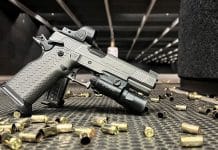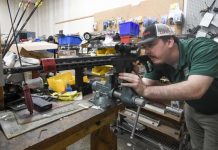Our partners over at SpotterUp.com published an article about the Dallas Police Department one year after five Officers were assassinated. What lessons were learned? Check out DALLAS POLICE DEPARTMENT 1 YEAR ON.
It is a logical anomaly that in this day and age our law enforcement as a profession learns mostly from tragedy. While not necessarily unique in that regard, we consistently prove that not broke-don’t fix it mentality, deliberate indifference and ignorance at its pure definition continue to cost law enforcement and civilian lives.
As we are presented with information at one year anniversary of assassination of the Dallas 5: Senior Corporal Lorne Ahrens, Officer Michael Krol, Sergeant Michael Smith, Officer Brent Thompson, Officer Patrick Zamarripa, that officers working the downtown event were directed not to wear heavier armor or carry patrol rifles.

Dallas police officers embrace after police responded to a shooting incident in Dallas, Texas. REUTERS/Brandon Wade
The decision is reminiscent of another about 7 years prior, where four officers were killed during a tactical situation, and a member of command staff made the decision not to stage a tactical emergency medical services team during the incident.
At its core, these decisions and many others like them are a basic yet critical failure of leadership. Leadership, which themselves have been conditioned by peers, communities, politics to sacrifice where sacrifices are unacceptable.
Choose a speed detection device or replace surplus helmets, decide on patrol rifles for the cars or desks for the office, offer new life-saving training or save on overtime… No decision by an administrator or a true leader will usually go un-scrutinized. This includes leadership by line officers on the street, as they are second-guessed by the citizens they serve, the media and their own command. Comes with the territory, right?
At some point these unifying parallels which collectively comprise the thin blue line fray and the line becomes weaker, because there is no leader, no true spokesperson who can be the cord to keep the strands in place. The disconnect between those who do the work, and those who direct the work to be done, for some reason and almost mandatorily dictate that a separation be made of “us” and “them”, when the tragic events prove that there can be only “us”.

Unlike the military, the learning curve in police work is smaller based on the number of interactions and elements of those which can potentially turn against everyone.
By design, the buffer between poor leadership and the effect it has on the pavement pounders is also less. Regardless of the agency size, one decision at a specific administrative level can have unilateral consequences, and at the same time involve no other member of administration.
For example, a Captain can pass down a decision to drive the squads with the windows down in Montana in January, and the Chief may not find out until one member of the agency complains, goes off road, or something happens which informs the top brass of the change. Also unlike the military, law enforcement typically has no luxury to implement a tool, tactic or policy on a small scale, test out the effectiveness, and then roll it out to everyone.
Where resources have been committed to doing so, lives have been saved. While such improvement approach has often been used in the military by having special forces elements try something to see if it works and then going service-wide, most of what is learned in police work is patrol-level, and stays applicable to patrol, street-level, daily interactions of police and their communities.
So it is in the best interest of everyone involved to not only communicate across the professional spectrum, but also learn and directly and immediately implement the lessons of one encounter, profession-wide. But it doesn’t happen that way. Still. Columbine directed a changing approach to active threats, Hollywood bank robbery embracing of the patrol rifles, Texas tower to tactical emergency medicine in law enforcement… But to this day we have reactive mentality, as again was the case after July 2016. Multiple agencies went to higher level plates and rifles.

Micah Xavier Johnson ambushed and fired upon a group of police officers in Dallas, Texas, killing five officers and injuring nine others.
We still have departments unaware of the critical nature or tourniquets and related training. Why is this normal? Why is there no outrage in the community which is directly affected by the ability and training of their police to be effective in their duties? Maybe it’s because we haven’t advocated for ourselves, and have been behaviorally trained that we are in fact – expandable. The classic motto of “lead me, follow me, or get out of the way” is not just fitting, it should be the directive and a way to address the leadership so lacking in this field.
Law enforcement is a continuous, contradictory dichotomy. It is a constant state of balance which can only be effective with the right training, priorities, and leadership. It is the need to be effective in preserving life, but not looking to dangerous or “militaristic” because you have to use the tools dictated by the threats. It’s mandatory requirement to make the right infallible decision, but doing so at a moment’s notice.
The expectation to return to work with the same confidence, after facing hordes of criticisms and internal inquiries by those you expected to trust. A sheriff can be elected to run a law enforcement agency without ever serving a day behind the badge. A police chief has to rise within the ranks or bring experience with.

The reason that so many agencies are successful despite the issues described above is the heart of the profession. Those who truly believe their mission and passion, those leaders who focus from talking to doing, and the communities which trust their peacekeepers. One year ago we lost five heroes in a single incident. We will remember them, we will learn, and we will prevail.












